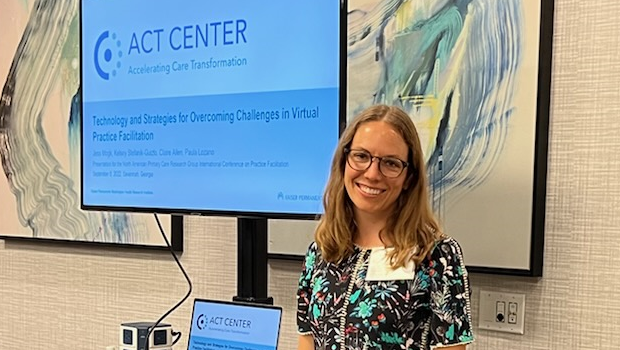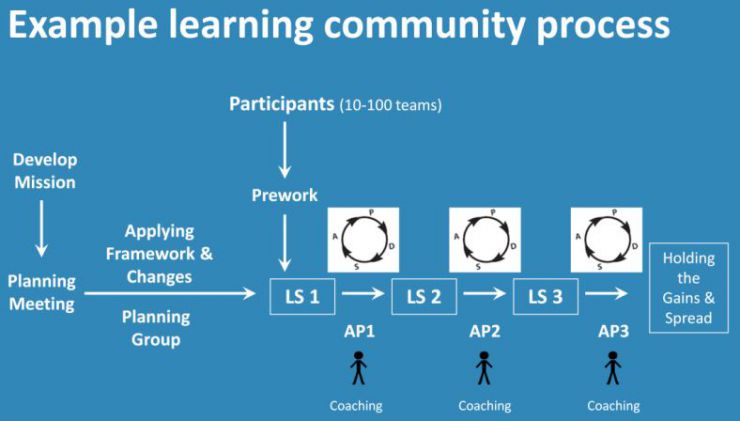Why we need practice facilitators now more than ever

Photo by Kelly Wiseman
Fresh from an international conference on practice facilitation, Jess Mogk reflects on what’s next as the field advances
By Jess Mogk, MPH, a collaborative scientist and practice facilitator with the Center for Accelerating Care Transformation (ACT Center) at Kaiser Permanente Washington Health Research institute
I had the privilege to attend and present at the North American Primary Care Research Group International Practice Facilitation Conference in Savannah, Georgia on September 8-9. The theme was building resilience and promoting professional wellness for care teams, facilitators, and research teams.
Practice facilitators are in a unique position to help build organizational wellness and improve conditions for care teams. Our job is to work alongside clinic staff to make the hard work of quality improvement easier — focusing on improving care for patients while also streamlining processes to improve work life for staff. Practice facilitation (also called “practice coaching”) is a key area of focus for the ACT Center, and I’ve gained valuable experience as a practice facilitator on the center’s Integrated Pain Management Program, which launched just before the onset of the COVID-19 pandemic.
The conference gave me the opportunity to meet other practice facilitators doing similar work during challenging times, which was both exciting and sustaining. From improving professional wellness, to advancing equity, to getting the most out of virtual facilitation, we shared ideas and strategies that highlighted where our field is headed in the post-pandemic era. I came away with fresh inspiration and a clear view of how our work as practice facilitators is more important than ever.
Back to basics: Professional wellness is essential
The conference kicked off with an excellent plenary on professional wellness by Dawn Creach of Creach Consulting Group. Dawn talked about how the pandemic has blurred the boundaries between the personal, societal, and professional, and how we’ve all experienced upheaval in these spaces to various degrees. With health care still facing serious ongoing challenges, practice facilitators are looking for ways to support care teams through burnout and moral injury and trauma.
Dawn also shared the article Beyond Burnout: A Physician Wellness Hierarchy Designed to Prioritize Interventions at the Systems Level, which lays out a “health professional wellness hierarchy.” Health systems are often asking care teams to focus on patients and quality improvement — but the basics need to come first. Do care teams have time to use the bathroom or grab a snack between patients? Do they feel safe and respected at work? Practice facilitators can help surface these issues and find strategies to improve conditions that impact care teams.
Additionally, practice facilitator wellness must also be addressed because we are often exposed to secondary trauma and compassion fatigue. It’s essential that we take care of ourselves and receive support from peers. This conference was a great opportunity to network and exchange self-care tips with fellow practice facilitators.
Finding inspiration: Equity, inclusion, and diversity
One of the most inspiring conference sessions I attended was about equity, inclusion, and diversity in practice facilitation. Practice facilitators have a distinct opportunity to help move the needle on inclusive practices and health equity in our work with clinics.
The session’s lead presenter, Taryn Bogdewiecz, shared how they and their colleagues from the University of Colorado Practice Innovation Program use “SMARTIE” goals when working with care teams. “SMARTIE” takes the familiar SMART framework for setting goals and adds “inclusion” and “equity.” Taryn and their co-presenters started the session with an introduction that included their pronouns and explained how this small and routine gesture can make spaces more welcoming to people who identify as nonbinary — or anyone whose style or appearance does not conform to strict gender norms.
Other projects that inspired me included a successful effort to coach teams on gathering inclusive race, ethnicity, gender, and sexuality data, shared by Megan Bowen at OCHIN, and a deeply moving story on institutional and interpersonal racism from Victoria Dorimain at Université de Sherbrooke Department of Family and Emergency Medicine in Quebec, Canada. After the session, presenters and attendees exchanged tips and resources. No one had easy answers, but the discussion demonstrated our deep commitment to the work and our desire to keep learning and growing in this space.
Shaping the future: Practice facilitators as change agents
The future of practice facilitation was a key topic at the conference. We’ve all experienced so much change in the last couple years. But practice facilitators are trained change helpers, and we’re in a unique position to help change happen in a positive way. We also have an important opportunity to think about new practice facilitation strategies that emerged during the urgency of the pandemic. How might these strategies still be useful — or even beneficial — in our work? How might we use what we learned during COVID-19 to help shape the future of our field?
My presentation on technology and strategies for overcoming challenges in virtual practice facilitation was a great fit for this theme and was very well received. Among the tips I shared:
- Make collaboration easier by using a shared online platform for team documents and conversation.
- Account for less-than-ideal technology by adjusting agendas to accommodate technical difficulties and creating time to meet one-on-one with team members who need extra tech support.
- Manage power dynamics by using features like hand-raising or asking each person to share “round robin.”
- Bring in an element of fun by starting meetings with icebreakers and by encouraging the use of features like chat, reactions, emojis, and gifs.
Many of these tips can help build positive team dynamics, whether we’re facing an abrupt shift to a virtual world or doing business as usual. As a society, and as a health care workforce, we are in a pivotal change moment, and we have an opportunity to shape those changes.
I’m reminded of Octavia Butler’s visionary novel “Parable of the Sower,” which centers around a community that lives behind a wall in fear of what might be on the other side. The story is based on the central theme that life is all about change — and that we can shape the change we want to see in the world by leaning into change and preparing for it. I see myself and my fellow practice facilitators as change makers. We bring helpful tools and strategies to hardworking to care teams in order to support conscious, intentional change when it’s needed most.
Jess would like to thank the many practice facilitators who shared their work and inspired her during the conference, especially: Victoria Dorimain from Université de Sherbrooke; Megan Bowen, Molly Volk, Oyinkansola “Bukky" Ogunrinde, and Ann Romer from OCHIN; and Taryn Bogdewiecz, Kathy Cebuhar, and Stephanie Kirchner from University of Colorado.
Featured Resource

Coach Medical Home equips practice facilitators to support primary care clinics as they improve quality of care.
Learn More

Practice facilitation, also called “coaching,” is a proven way to support system change in a practice.
Related News


